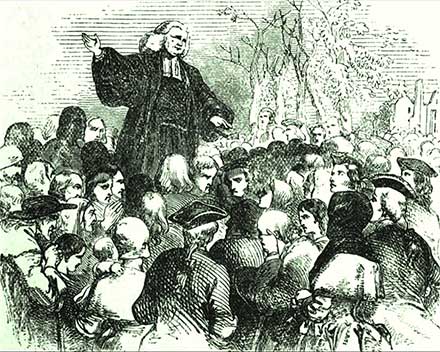
George Whitefield was a well-known evangelist during the Evangelical revival in England in the eighteenth century, a co-laborer at times with John and Charles Wesley. Although he did not suffer martyrdom, he suffered ridicule and knew what it was to be excluded from pulpits. Therefore he could speak first hand of persecution. One of his more famous sermons was titled, “Persecution Every Christian’s Lot.” In it he presented a biblical perspective on Christian suffering.
His began with the Lord’s statement that his disciples would suffer persecution in his name. This was the experience of Paul who, after persecuting Christians, became a follower of Jesus and suffered much himself. Paul spoke with authority when he said those who seek to live a godly life in Christ will be persecuted.
The foundational truth, then, upon which Whitefield built his sermon was that persecution would be the experience of every godly person. This brought Whitiefield to ask three questions: (1) What does it mean to live a godly life in Jesus Christ? (2) What does persecution look like? And finally, (3) Why it is that godly men must expect to suffer persecution?
According to Whitefield, the answer to the first question, what it means to live a godly life, is to “make the divine will … the sole principle of all our thoughts, works, and actions.” With affections on things above, a Christian’s citizenship is in heaven. The world reacts negatively against this, perhaps in the misinformed belief that Christians are not concerned with this world and so are a liability rather than an asset to the advancement of the world’s agenda.
In answer to his second question, Whitefield described types of persecution. The first is hidden in the heart. This “heart-enmity” is the source of all overt persecution. Persecutors harbor evil-will against God and His kingdom even if they do not savagely manifest it. A second type of persecution is that of the tongue, which spews out evil against God’s people. Whitefield regarded evil-speaking as a high form of persecution. To slander God’s people is “highly provoking in the sight of God.” Jesus Christ will call such slanderers to account. The third kind of persecution is cruel treatment of Christians by religious authorities who specifically target them “under the cloak of religion.”
Whitefield’s third question asked why godly men must expect persecution. His answer was two-fold: First, because Christ said to expect it; and second, because it had been the experience of genuine Christians of every age. Wicked men, he said, hate God and hate those who are like him. Pride and envy cause them to turn to persecution.
Persecution to the same degree does not happen to all godly people. There are times when the religious situation is more peaceful and persecution is less intense than at other times. Nonetheless, all Christians must experience some degree of persecution.
Finally, Whitefield asked his Christians auditors why, if all were to suffer for their faith, some were not actually suffering? Had cowardice caused them to remain silent when they should have spoken? Were they ashamed of Christ?
To those who were contemplating becoming Christians, he asked were they ready to give up everything to God? Were they ready for the opposition that might come from their own households? Were they willing to endure hardness? When they put their hands to the plough, were they resolve not to look back?
In closing Whitefield turned his attention to the persecutors. Christ was allowing them to persecute but they would be held accountable at the judgment. On that terrible day Christ would ask an ominous question, “Why were you persecuting me?” In warning, Whitefield vividly described the punishment a persecutor could expect to receive.
[This blog is based on work by Roy Stults]
